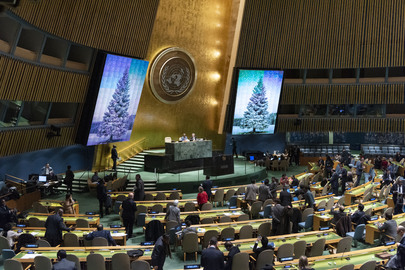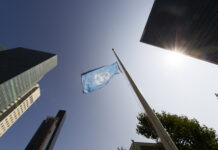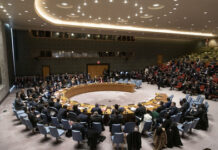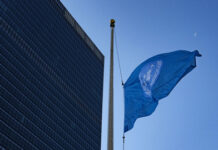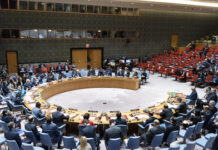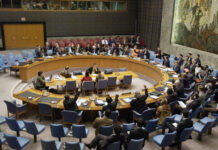This is the News in Brief from the United Nations.
Gaza: Less than 1 in 2 UN aid missions allowed into northern zones this month
Less than half of the UN aid missions planned for Gaza’s hunger-ravaged north have made it so far this month, aid teams said on Wednesday, despite repeated appeals from the international community to ramp up relief to more than one million people facing starvation.
Speaking in Brussels, UN Secretary-General António Guterres described as “abhorrent” the 7 October terror attacks led by Hamas on Israeli communities.
But nothing justifies the collective punishment of the Palestinian people, the UN chief insisted, in an appeal to act “before it is too late” for Gazans:
“I call on the Israeli authorities to ensure complete and unfettered access for humanitarian goods throughout Gaza and for the international community to fully support our humanitarian efforts.”
In its latest update, the UN Office for the Coordination of Humanitarian Affairs (OCHA) said that the first two weeks of March saw just 11 out of 24 missions allowed through by Israeli authorities.
“The rest were either denied or postponed,” OCHA said.
Aid missions primarily carry food, nutrition items and supplies to hospitals, but they can also include health assessments, OCHA said, as it once again warned that “access constraints” continue to “severely affect the timely delivery of life-saving assistance…to hundreds of thousands of people in northern Gaza”.
Belarus ‘unsafe to return’ for those in exile, UN rights office warns
To Belarus, where the number of political prisoners is growing, independent civic space is “closed” and people continue to be arrested for their part in protests linked to the disputed 2020 presidential election, the UN Human Rights Council heard on Wednesday.
According to a new report from the UN human rights office, OHCHR, laws passed or amended since the widespread unrest have increasingly oppressed and punished real or perceived opponents.
Several prominent human rights defenders, journalists, and trades unionists received long prison terms last year, the UN report noted, and thousands have been detained, including some for their actions dating back to the re-election of Alexander Lukashenko, who has been President of Belarus since 1994.
Addressing the Human Rights Council in Geneva, OHCHR’s Christian Volkman said that no opposition party was able to register for the Parliamentary election held last month. This is a concern ahead of new presidential elections in 2025, Mr. Volkman added:
“Since 2020, thousands of Belarusians have been subjected to cruel, inhumane, or degrading treatment or punishment in detention facilities across Belarus. OHCHR documented cases where torture resulted in severe injuries, along with instances of sexual and gender-based violence in detention facilities. Death and rape threats were widespread.”
The UN report – whose findings were rejected by Belarus – noted that an estimated 300,000 nationals have left the country fearing reprisals, and that the Government has prevented some from obtaining a passport abroad.
Returnees have also been arrested, indicating that it is “not safe for those in exile to return to Belarus,” the Human Rights Council heard.
Mpox deaths falling everywhere but Africa, says UN health agency expert panel
Cases of Mpox are falling everywhere except in Africa, a UN health agency expert panel has said, warning that the virus is causing “high mortality” in children under 15 years old.
The Strategic Advisory Group of Experts on Immunization meeting in Geneva noted that the African Mpox strain appears to have a different genetic blueprint to other outbreaks reported around the world.
Experts on the panel highlighted the need to monitor and find the source of an ongoing outbreak of Mpox in the Democratic Republic of the Congo which has been linked to 265 deaths.
From the UN health agency, here’s Dr Kate O’Brien:
“We’re very interested and very much encouraging the countries where this is being observed, in particular the Democratic Republic of Congo, to have access to the vaccine, to use the vaccine and to do evaluations of the vaccine performance, which we expect to be very high.”
Vaccines should be used in at-risk communities and in non-high risk populations, the expert panel said.
But they highlighted the problems caused by poor vaccine access in parts of Africa and urged greater investment in vaccine research on Mpox.
The World Health Organization announced that Mpox was no longer a public health emergency last May.
Daniel Johnson, UN News.
Source of original article: United Nations (news.un.org). Photo credit: UN. The content of this article does not necessarily reflect the views or opinion of Global Diaspora News (www.globaldiasporanews.com).
To submit your press release: (https://www.globaldiasporanews.com/pr).
To advertise on Global Diaspora News: (www.globaldiasporanews.com/ads).
Sign up to Global Diaspora News newsletter (https://www.globaldiasporanews.com/newsletter/) to start receiving updates and opportunities directly in your email inbox for free.


